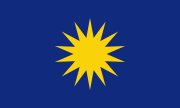
Back Malaysian Chinese Association German Asociación China de Malasia Spanish Association des Chinois de Malaisie French Persatuan Tionghoa Malaysia ID マレーシア華人協会 Japanese 말레이시아화인협회 Korean Persatuan Cina Malaysia Malay Persatuan Cina Malaysia Dutch Китайская ассоциация Малайзии Russian Malaysian Chinese Association SIMPLE
Malaysian Chinese Association Persatuan Cina Malaysia 马来西亚华人公会 Mǎláixīyà Huárén Gōnghuì | |
|---|---|
 | |
| Malay name | Persatuan Cina Malaysia ڤرساتوان چينا مليسيا |
| Chinese name | 马来西亚华人公会 Mǎláixīyà Huárén Gōnghuì |
| Tamil name | மலேசிய சீனர் சங்கம் Malēciya Cīṉar Caṅkam |
| Abbreviation | MCA / 马华 |
| President | Wee Ka Siong |
| Secretary-General | Chong Sin Woon |
| Deputy President | Mah Hang Soon |
| Vice-President | Lim Ban Hong Tan Teik Cheng Wee Jeck Seng Lawrence Low |
| Women Chief | Wong You Fong |
| Youth Chief | Ling Tian Soon |
| Founder | Tan Cheng Lock |
| Founded | 27 February 1949 |
| Preceded by | Malayan Chinese Association |
| Headquarters | 8th Floor, Wisma MCA, 163, Jalan Ampang, 50450 Kuala Lumpur |
| Newspaper | China Press The Star Nanyang Siang Pau Sin Chew Daily |
| Youth wing | MCA Youth Section |
| Women's wing | Wanita MCA |
| Ideology | Malaysian Chinese interests Social conservatism Three Principles of the People Historical: Chinese nationalism |
| Political position | Centre-right[1] |
| National affiliation | Alliance (1952–1973) Barisan Nasional (since 1973) |
| Colours | Blue and yellow |
| Dewan Negara: | 2 / 70 |
| Dewan Rakyat: | 2 / 222 |
| Dewan Undangan Negeri: | 8 / 611 |
| Party flag | |
 | |
| Website | |
| www.mca.org.my | |
The Malaysian Chinese Association (abbrev: MCA; Malay: Persatuan Cina Malaysia), fomerly known as the Malayan Chinese Association, is an ethnic political party in Malaysia that seeks to represent the Malaysian Chinese ethnicity; it was one of the three original major component parties of the coalition party in Malaysia called the Alliance Party, which later became a broader coalition called Barisan Nasional in Malay, or National Front in English.
Along with the largest and third largest component party in BN, i.e. United Malays National Organisation and Malaysian Indian Congress, MCA has a significant influence over the political arena in Malaysia since its independence. Through its holding of companies such as Huaren Holdings, MCA controls The Star, which is Malaysia's best-selling English newspaper.[2][3]
The party was once the largest party representing the Chinese community in Malaysia, and was particularly dominant in the early period until the late 1960s. Its fortunes fluctuated after the establishment of other political parties in the 1960s that challenged it for the Chinese votes, although it still enjoyed strong support in the mid-1990s to mid-2000s period. However, it has performed poorly in elections since 2008, with the Malaysian Chinese community mostly voting for the Democratic Action Party and People's Justice Party,[4] and in the 2018 Malaysian general election, it lost all but one of its parliamentary seats and was relegated to the opposition.[5] It returned to power in March 2020 as part of the alliance with Perikatan Nasional.[6] After the 2022 election, the party joined the government as a backbencher with Barisan Nasional supporting Pakatan Harapan.[7]
- ^ J Denis Derbyshire; Ian Derbyshire (1990). Political Systems Of The World. Allied Publishers. p. 118. ISBN 978-81-7023-307-7.
- ^ "A cash cow for Huaren". TheEdge. 23 March 2009.
- ^ Loghun Kumaran (25 June 2018). "With about RM3b in assets, MCA unlikely to fade away soon". Malay Mail.
- ^ "Thirteenth General Elections (GE13): Chinese votes and Implications on Malaysian Politics" (PDF). Kajian Malaysia. 32 (supp. 2): 25–53. 2014.
- ^ "Racial politics: where it all went wrong for the Malaysian Chinese Association?". Asia One. 4 March 2019.
- ^ Ng, Eileen. "MCA hopes to moderate new govt but needs to win voter trust". The Straits Times.
- ^ Nur Hasliza Mohd Salleh (21 December 2022). "Pua's jibe shows MCA's role as 'opposition' in BN, says analyst". Malaysia Now.